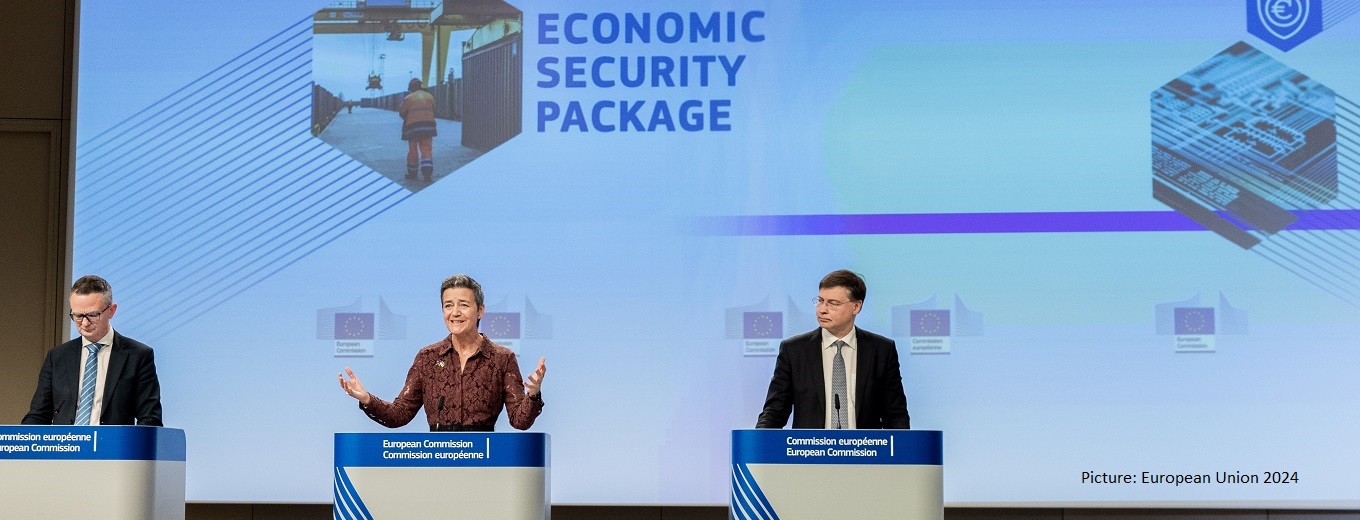The package includes proposals to increase research security and presents options on how the support of dual use R&I can be enhanced in the next EU programmes.
On 24 January 2024, the European Commission (EC) adopted a package of five initiatives to strengthen the EU’s economic security in the context of increased geopolitical tensions and accelerated technological shifts. The EC Communication on ‘advancing European economic security: an introduction to five new initiatives’ provides an overview on the new proposals. These proposals form a three-pillar approach to EU economic security by promoting the EU’s competitiveness, protecting against risks, and partnering with the broadest possible range of countries to advance shared economic security interests. The new package is closely aligned with the Joint Communication on a ‘European Economic Security Strategy’ of the EC and the High Representative of the Union for Foreign Affairs and Security Policy from 20 June 2023. The five initiatives of the package include a proposal for a new regulation on the screening of foreign investments, a White Paper on export controls, a White Paper on outbound investment – and the following two initiatives focusing on research and innovation: a proposal for a Council Recommendation on enhancing research security and a White Paper on options for enhancing support for research and development involving technologies with dual-use potential.
Margrethe Vestager, EC Executive Vice-President for a Europe Fit for the Digital Age highlighted that “the EU’s economic security relies on nurturing our technological edge and avoiding undesired leakage of technologies. We need a joint approach on research and development of technologies with dual-use potential in order to strengthen our competitiveness and resilience.” In this vein, the proposal for a Council Recommendation on enhancing research security aims to mobilise Member States to create awareness and strengthen resilience in the R&I sector. Member States would be recommended to establish policy frameworks for research security based on a whole-of-government approach, creating support structures, introducing safeguards through funding organisations, incentivising universities and other public and private research performing organisations to appoint research security advisers and introducing due diligence and risk management processes. The EU would play a complementary role by supporting policy learning, coordination, and consistency among Member States. This could be facilitated via the European Research Area (ERA) governance structures. Furthermore, the EC proposes to establish a European Centre of Expertise on Research Security and monitor progress in the implementation of this Recommendation as part of the biennial reporting on the Global Approach to R&I. The Competitiveness Council will discuss the Council Recommendation in May.
The White Paper on ‘options for enhancing support of research and development (R&D) of technologies with dual-use potential’ includes options on how to better support research and development involving technologies with dual-use potential that can have both civilian and military applications. The White Paper mentions the example of the EU Defence Innovation Scheme (EUDIS) under the European Defence Fund (EDF) that aims at identifying promising technologies in the civil domain and promoting their uptake in the defence domain. It puts forward three possible options for the future that could potentially change the future EU R&I framework programmes in a fundamental way: (1) going further based on the current setup (i.e., the R&I Framework programme and EUDIS/EDF mentioned above) and strengthening it; (2) removing the exclusive focus on civil applications in selected parts of the successor programme to Horizon Europe; (3) creating a dedicated instrument with a specific focus on dual-use R&D.
With the White Paper the EC launches a public consultation of public authorities, civil society, industry and academia on options for strategic support to technologies with a dual-use potential. The consultation is open for comments until 30 April 2024 and will inform the Commission’s next steps.
The EC Communication also lists additional initiatives that were already started in autumn 2023, like the ongoing risk assessment of critical technologies (see SwissCore article). Four of these technologies were recommended for an urgent joint risk assessment by the Commission and Member States: Advanced Semiconductor Technologies, Artificial Intelligence Technologies, Quantum Technologies, and Biotechnologies. The EC and Member States are currently working on these risk assessments, drawing on inputs from stakeholders like the Industrial Forum, with a view to reporting in February. The work on the risk assessments focuses particularly on risks to technology security and technology leakage.
Furthermore, the EC plans to enhance dialogues on economic security topics with third countries associated to Horizon Europe, like the United Kingdom, Canada, and New Zealand.

